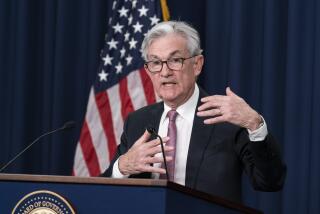Sprinkel Predicts Decline in Interest Rates, Jobless
- Share via
WASHINGTON — President Reagan’s economic adviser, Beryl W. Sprinkel, said Wednesday that the recent rise in inflation is only temporary and does not threaten the gains that the economy has made since 1981.
Sprinkel, chairman of Reagan’s Council of Economic Advisers, blamed the recent inflation rise on temporarily higher food prices after the drought and higher priced imported goods caused by the weaker dollar.
“We went through what I would call an inflationary scare,” Sprinkel told reporters as he released a report on the state of the U.S. economy.
Acknowledging a fierce debate in the financial community over the direction of interest rates, Sprinkel said he believed that they also would decline.
“My own view is that with . . . less active demand for funds, accompanied by a continued gradual abatement in the inflationary scare, that we can expect some relief on interest rates in the period ahead.”
Concerning inflation, Sprinkel said he was not happy with a 4% rate but saw no reason for it to accelerate.
“We cannot have exploding inflation unless you step on the accelerator on the fiscal and monetary side, and we are not doing that,” he said.
The Administration had no plans to increase federal spending, and the Federal Reserve is following a strategy designed to bring inflation gradually under control, he said.
“Our objective from the beginning has been to pull it on down to zero,” he said.
The financial markets have been concerned that the U.S. economy has been growing too rapidly and is in danger of overheating, which could boost inflation.
The Federal Reserve, in response to those concerns, nudged up interest rates during the spring and raised its key discount rate, the interest it charges banks for loans, to 6.5% from 6.0% on Aug. 9.
Inflation has been near 3.4% a year for the past six years but has been about 4.4% for the past 12 months. Sprinkel said U.S. economic growth has slowed to a non-inflationary level.
Sprinkel said the Council of Economic Advisers still believed its earlier forecast of 1988 growth of 3.0% to be “reasonably viable.”
Since the economy grew at a 3.2% rate in the year’s first half after adjustment for inflation, it would have to grow at a 2.8% rate in the second half, he said, adding that slower growth did not mean an increase in the jobless rate.
“I think further progress can be made in reducing the unemployment rate in the months ahead. That’s our projection and that’s our best judgment,” he said.
More to Read
Get the L.A. Times Politics newsletter
Deeply reported insights into legislation, politics and policy from Sacramento, Washington and beyond. In your inbox twice per week.
You may occasionally receive promotional content from the Los Angeles Times.










